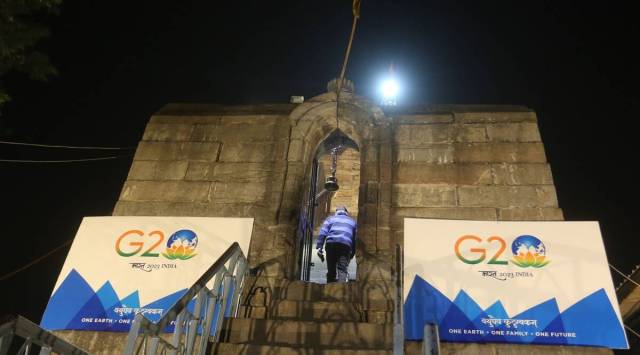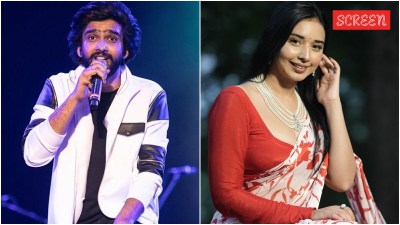AMID THE hardening of positions on the Russia-Ukraine war which entered its second year last week, External Affairs Minister S Jaishankar will host US Secretary of State Antony Blinken, Russian Foreign Minister Sergey Lavrov and Chinese Foreign Minister Qin Gang among others at the G20 Foreign Ministers’ meeting beginning on Wednesday.
Coming days after the G20 Finance Ministers failed to agree on a joint communique since there was no consensus on the reference to the Russia-Ukraine war, the Foreign Ministers’ meeting is set to test India’s diplomatic tightrope walk.

This will be Blinken’s first visit to India since the war began last year (he last came to India in July 2021); Lavrov’s second visit in a year (he was in Delhi in April 2022); and Qin’s first visit as the newly appointed Chinese Foreign Minister. Qin’s predecessor Wang Yi had come to India in March last year.
The meeting, which will take place in the Rashtrapati Bhavan premises, will begin with a welcome reception and dinner on Wednesday evening for the visiting Foreign Ministers. This will be followed by a day-long meeting on Thursday, which will tackle six issues in two sessions.
The first session in the forenoon will discuss “strengthening multilateralism and need for reforms”, “food and energy security” and “development cooperation”. This will be followed by bilateral meetings and lunch. The afternoon sessions will discuss “counter-terrorism: new and emerging threats”, “global skill mapping and talent pool” and “humanitarian assistance and disaster relief”.
While India, which holds the G20 presidency, would like a consensus on all these topics, the shadow of the Russia-Ukraine war has polarised conversations in the past.
In an exclusive interview to The Indian Express, Josep Borrell, High Representative of the European Union for Foreign Affairs and Security Policy who is attending the G20 meeting, said: “I think the Indian position has been made very clear by Prime Minister Modi himself — ‘this is not a time for war’ — and he is right.”
Story continues below this ad
“India is renowned as the largest democracy in the world and has a very influential voice on the world scene. The international community needs to come together and ensure that international law will prevail against Russia’s blatant violation of and disregard for the UN Charter. It is dangerous for the entire world if a permanent member of the UN Security Council violates, in such a brutal way, international law and rules. Such behaviour, if left unanswered, can only encourage others who decide to remodel the borders or the world with military means,” said Borrell.
“This is an unprecedented situation internationally and will inevitably also have an impact on G20 proceedings. As in Bali, we will work for a G20 declaration that recognises the facts on the ground,” he said, adding, “We trust the Indian presidency and we will support its work towards an outcome that reflects the current extraordinary circumstances”.
Besides Blinken, Lavrov, Qin and Borrell, France’s Catherine Colonna, Germany’s Annalena Baerbock, British Foreign Secretary James Cleverly, Italian Foreign Minister Antonio Tajan, Australia’s Penny Wong, Saudi Foreign Minister Prince Faisal bin Farhan, Indonesia’s Retno Marsudi and Argentine Foreign Minister Santiago Cafiero are among those attending the meeting.
India, which has not explicitly condemned the Russian invasion of Ukraine, is mindful of the challenge at hand as well as the precedent in Indonesia, which could not arrive at a consensus document or a joint communique in the 16 ministerial meetings in the lead up to the G20 leaders’ summit in November.
Story continues below this ad
The contention is the crucial paragraph, which echoes Prime Minister Narendra Modi’s now-famous statement to Russian President Vladimir Putin in Samarkand in September last year on the sidelines of the Shanghai Cooperation Organisation summit where he said “this is not the era of war”. While the Western countries in the G20 led by the US — especially the G7 — want the inclusion of paragraphs from the Bali declaration, Russia and China have opposed it.
After the G20 Finance Ministers’ meeting, the Russian Foreign Ministry had applauded “the constructive role” of the Indian presidency and its efforts to have “fair consideration of interests and positions of all countries”.
“Our opponents, primarily the United States, EU and G7, continue their paranoid attempts to isolate Russia and shift the blame for the provoked problems in the area of international security and the global economy onto it,” Moscow had said.
Besides participating in the G20 meeting, a number of Foreign Ministers are set to take part in the Raisina Dialogue, India’s annual conference on geo-politics and geo-economics.
Story continues below this ad
The G20 comprises Argentina, Australia, Brazil, Canada, China, France, Germany, India, Indonesia, Italy, Japan, the Republic of Korea, Mexico, Russia, Saudi Arabia, South Africa, Turkey, the UK, the US and the European Union.









